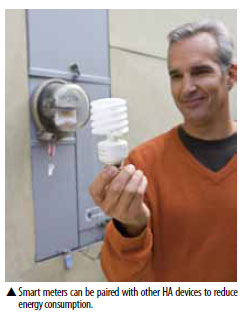CO-PETITION
HA systems will no longer be confined to two niche markets: luxury custom-designed systems and DIY systems, according to ABI Research. Systems are becoming more mainstream. Managed HA, driven by broadband and telecom service providers, will show the strongest growth of all, with an anticipated 1.3 million shipments in 2013.
Despite various telcos and broadband ISPs eyeing the HA market, traditional security providers remain confident about their expertise.
One of the greatest advantages telcos/broadband ISPs have is their data pipeline direct to the residential security and HA market. “However, these companies fall short in a number of areas,” Pyle said. “First and foremost, their expertise is not in home security and HA. Traditional security installers and service providers have years of experience servicing the customer in this market. There are also many questions for telcos/ISPs on servicing and supporting security and HA customers. It is yet to be seen how these companies will cooperate/ compete with current industry players.”
Being large organizations, telcos/ ISPs will partner with the biggest manufacturers, which prevent prices from being competitive. Moreover, this allows traditional security providers to remain the preferred option, Baratta said.
“I think it is great that the telcos are getting into security again. It creates more demand for industry professional service providers, as the telcos advertise and promote their offering,” Ingram said. “We also have to take into consideration what end users think about telcos offering HA, since not everyone will want a ‘cable' provider to handle their security.”
Other security experts saw the entry of telcos/ISPs as a great opportunity of cooperation. Telcos and ISPs need system integrators to support their infrastructure and leverage know-how, Al Jaziri said.
FUTURE OUT LOOK
The gloomy economic outlook and plummeting home prices affect HA uptake, as residential development is closely tied to construction. “The trend we see is the need for retrofit solutions,” Ingram said. “Installers are looking for ways to grow their business by entering existing homes and buildings and retrofitting with wireless alarm systems, eliminating the need for adding to or modifying existing wiring.”
Compared to the rest of the world, the recession hurt Asia least for residential security up take . For the most part, countries with booming construction and infrastructure development have plentiful opportunities, such as India and China.
It is important that real estate developers think beyond traditional services and identify the desired purpose, experience and performance of each development. Existing and new properties need to be transformed into the buildings of the future.
Digital technology can be a tool to boost real estate values. An important aspect of today's most innovative and valuable real estate is connectivity — the ability to facilitate communication and interaction among buildings and digital infrastructure.
With many countries developing their IT infrastructure and countless people signing up for broadband and mobile service, IP-based systems are gaining greater acceptance.
Apartment building owners are beginning to see the benefits of IP-based systems, particularly for completely new projects, as they save installation time and cost. When this foundation is laid, IP-based technologies will grow.
Energy Management
 “Manufacturers and service providers in the residential sector will continue to be driven to compete on price,” Pyle said. “As margins become tighter, they will need to look to new products/services and innovation as a means to be competitive and relevant. There are opportunities for real savings with integrated energy management solutions.”
“Manufacturers and service providers in the residential sector will continue to be driven to compete on price,” Pyle said. “As margins become tighter, they will need to look to new products/services and innovation as a means to be competitive and relevant. There are opportunities for real savings with integrated energy management solutions.”
Al Jaziri envisioned huge potential for energy management integrated with HA systems. “We believe that the custom installation industry will wane during the next few years — the companies that are smart and look to take advantage of energy savings, the smart grid and the smartphone revolution will take center stage.”
 Eco-friendly benefits, such as reducing carbon footprints, may seem abstract. However, when it comes to paying one's utility bills, homeowners grow in creasingly energy- conscious. By integrating energy monitoring features into HA systems, homeowners can see real-time energy usage and cost spent. Furthermore, customers can reduce energy use and costs by controlling how and when specific devices use power — particularly during peak pricing or load periods, and in a way that fits with their lifestyle and priorities.
Eco-friendly benefits, such as reducing carbon footprints, may seem abstract. However, when it comes to paying one's utility bills, homeowners grow in creasingly energy- conscious. By integrating energy monitoring features into HA systems, homeowners can see real-time energy usage and cost spent. Furthermore, customers can reduce energy use and costs by controlling how and when specific devices use power — particularly during peak pricing or load periods, and in a way that fits with their lifestyle and priorities.
“By 2020, every UK home will have a smart meter, meaning your home will have a real-time dialogue with your utility company, changing prices and usage dynamically in real-time based on peak demand across the whole country,” said Dave Bell, CEO of Vesternet. All smart meters can then be paired with other HA devices, such as door sensors or smart sockets for reducing energy consumption.